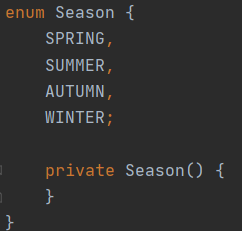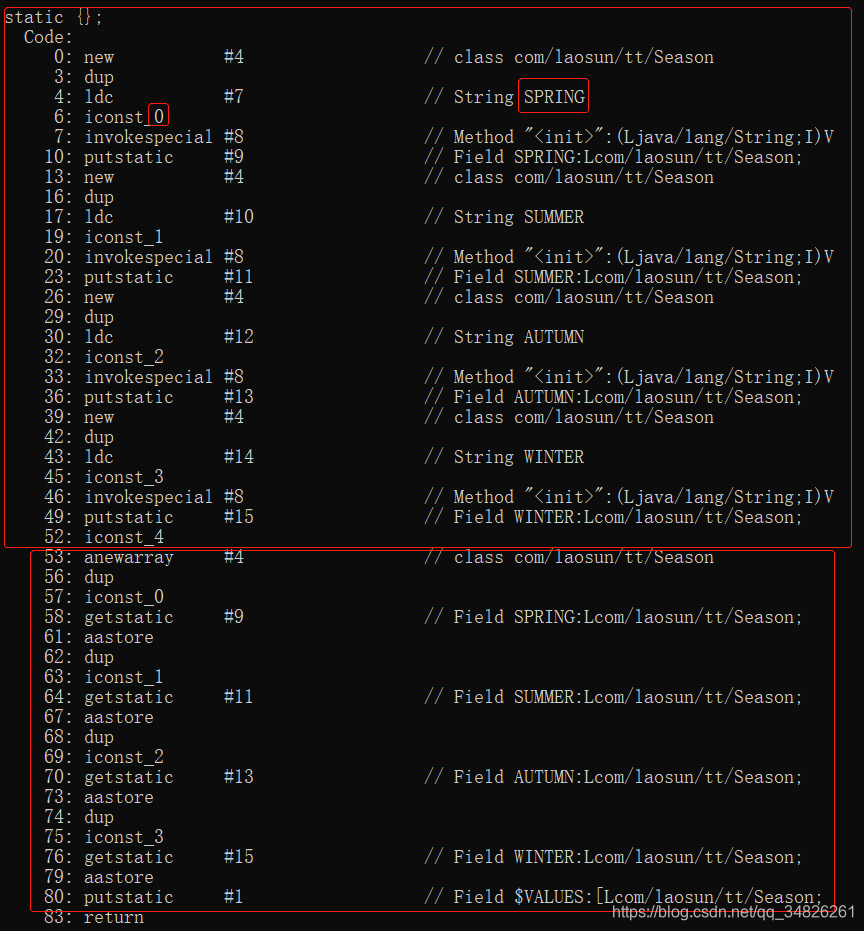Java枚举类enum原理详解
为什么要使用枚举类
枚举类enum作为Java5新增特性的一部分,是用来代替常量的。
比如以下场景,定义一年的四个季节:
public class Season {
public final int SPRING = 1;
public final int SUMMER = 2;
public final int AUTUMN = 3;
public final int WINTER = 4;
}
这样写没有错,但是存在一些不足,如果存在定义int值相同的变量,容易混淆,在类型安全和使用便利性上没有多少好处。
使用枚举类,能够提高代码维护性,确保变量合法;提高代码可读性;代码简洁,提高代码键入。用枚举类定义一年四个季节如下:
public enum Season {
SPRING, SUMMER,
AUTUMN, WINTER
}
使用也很方便:
public class SeasonTest {
public static void main(String[] args) {
Season season = Season.SPRING;
}
}
// 此处是为了编译方便在同一个类下定义枚举类
enum Season {
SPRING, SUMMER,
AUTUMN, WINTER
}
枚举类原理
程序运行后,在out目录下可以看到Season.class,这是编译后编译器自动生成的一个与枚举相关的类。此时只能看出其多了一个默认的私有构造函数。


对Season.class进行反编译:在命令窗口,class文件所在路径下执行命令:
javap -c Season.class
可以看到编译器帮我们生成了一个被final修饰的Season类,且继承Enum类,声明了四个Season类型的静态常量,并生成两个静态方法values()和valueOf()。
1、values()方法的实现是返回$VALUES.clone(),$VALUES是什么在static程序块里分析,该方法的功能是以数组形式返回枚举类的所有变量,对于Season来说就是Season[]{SPRING, SUMMER, AUTUMN, WINTER}。valueOf()的实现是调用父类Enum的valueOf(Class enumType, String name)方法,相比于父类的两个参数,此处只有一个String类型的形参,功能是根据字符串获取对应的枚举变量。
2、static代码块的内容:
第一个大红框是对四个静态常量的赋值,比如0-10行对应着:SPRING = new Season(SPRING", 0);以此类推。
第二个大红框是生成$VALUES数组,相当于$VALUES = (new Season[] {SPRING, SUMMER, AUTUMN, WINTER});到此可以看出实际上用enum定义的枚举类在经过编译之后变成了一个实实在在的类。


enum类所继承的父类java.lang.Enum
1、成员变量及构造方法
private final String name; // 枚举常量的名称
private final int ordinal; // 枚举常量的序数
protected Enum(String name, int ordinal) {
this.name = name;
this.ordinal = ordinal;
}
2、其主要方法有:
| 方法名 | 修饰符 | 返回值类型 | 说明 |
|---|---|---|---|
| name() | public final | String | 返回枚举常量的名称,和声明时的名称一致。即返回name。 |
| ordinal() | public final | int | 返回枚举常量的序数。即获取ordinal。 |
| toString() | public final | String | 和name()方法一致。 |
| equals(Object other) | public final | boolean | 判断指定对象和枚举常量是否相等。 |
| hashCode() | public final | int | 返回哈希编码。 |
| compareTo(E o) | public final | int | 比较枚举常量和指定对象的大小,通过ordinal进行比较。 |
| getDeclaringClass() | public final | Class | 返回与此枚举常量的枚举类型相对应的 Class 对象。 |
| valueOf(Class enumType, String name) | public static | <T extends Enum> T | 按指定名称返回其对应的枚举常量。 |
其他用法
实际上,枚举类除了不能再继承其他类(这是因为其已经继承了Enum类),和class类的用法是一样的。
附java.lang.Enum源码
package java.lang;
import java.io.Serializable;
import java.io.IOException;
import java.io.InvalidObjectException;
import java.io.ObjectInputStream;
import java.io.ObjectStreamException;
/**
* This is the common base class of all Java language enumeration types.
*
* More information about enums, including descriptions of the
* implicitly declared methods synthesized by the compiler, can be
* found in section 8.9 of
* <cite>The Java™ Language Specification</cite>.
*
* <p> Note that when using an enumeration type as the type of a set
* or as the type of the keys in a map, specialized and efficient
* {@linkplain java.util.EnumSet set} and {@linkplain
* java.util.EnumMap map} implementations are available.
*
* @param <E> The enum type subclass
* @author Josh Bloch
* @author Neal Gafter
* @see Class#getEnumConstants()
* @see java.util.EnumSet
* @see java.util.EnumMap
* @since 1.5
*/
public abstract class Enum<E extends Enum<E>>
implements Comparable<E>, Serializable {
/**
* The name of this enum constant, as declared in the enum declaration.
* Most programmers should use the {@link #toString} method rather than
* accessing this field.
*/
private final String name;
/**
* Returns the name of this enum constant, exactly as declared in its
* enum declaration.
*
* <b>Most programmers should use the {@link #toString} method in
* preference to this one, as the toString method may return
* a more user-friendly name.</b> This method is designed primarily for
* use in specialized situations where correctness depends on getting the
* exact name, which will not vary from release to release.
*
* @return the name of this enum constant
*/
public final String name() {
return name;
}
/**
* The ordinal of this enumeration constant (its position
* in the enum declaration, where the initial constant is assigned
* an ordinal of zero).
*
* Most programmers will have no use for this field. It is designed
* for use by sophisticated enum-based data structures, such as
* {@link java.util.EnumSet} and {@link java.util.EnumMap}.
*/
private final int ordinal;
/**
* Returns the ordinal of this enumeration constant (its position
* in its enum declaration, where the initial constant is assigned
* an ordinal of zero).
*
* Most programmers will have no use for this method. It is
* designed for use by sophisticated enum-based data structures, such
* as {@link java.util.EnumSet} and {@link java.util.EnumMap}.
*
* @return the ordinal of this enumeration constant
*/
public final int ordinal() {
return ordinal;
}
/**
* Sole constructor. Programmers cannot invoke this constructor.
* It is for use by code emitted by the compiler in response to
* enum type declarations.
*
* @param name - The name of this enum constant, which is the identifier
* used to declare it.
* @param ordinal - The ordinal of this enumeration constant (its position
* in the enum declaration, where the initial constant is assigned
* an ordinal of zero).
*/
protected Enum(String name, int ordinal) {
this.name = name;
this.ordinal = ordinal;
}
/**
* Returns the name of this enum constant, as contained in the
* declaration. This method may be overridden, though it typically
* isn't necessary or desirable. An enum type should override this
* method when a more "programmer-friendly" string form exists.
*
* @return the name of this enum constant
*/
public String toString() {
return name;
}
/**
* Returns true if the specified object is equal to this
* enum constant.
*
* @param other the object to be compared for equality with this object.
* @return true if the specified object is equal to this
* enum constant.
*/
public final boolean equals(Object other) {
return this==other;
}
/**
* Returns a hash code for this enum constant.
*
* @return a hash code for this enum constant.
*/
public final int hashCode() {
return super.hashCode();
}
/**
* Throws CloneNotSupportedException. This guarantees that enums
* are never cloned, which is necessary to preserve their "singleton"
* status.
*
* @return (never returns)
*/
protected final Object clone() throws CloneNotSupportedException {
throw new CloneNotSupportedException();
}
/**
* Compares this enum with the specified object for order. Returns a
* negative integer, zero, or a positive integer as this object is less
* than, equal to, or greater than the specified object.
*
* Enum constants are only comparable to other enum constants of the
* same enum type. The natural order implemented by this
* method is the order in which the constants are declared.
*/
public final int compareTo(E o) {
Enum<?> other = (Enum<?>)o;
Enum<E> self = this;
if (self.getClass() != other.getClass() && // optimization
self.getDeclaringClass() != other.getDeclaringClass())
throw new ClassCastException();
return self.ordinal - other.ordinal;
}
/**
* Returns the Class object corresponding to this enum constant's
* enum type. Two enum constants e1 and e2 are of the
* same enum type if and only if
* e1.getDeclaringClass() == e2.getDeclaringClass().
* (The value returned by this method may differ from the one returned
* by the {@link Object#getClass} method for enum constants with
* constant-specific class bodies.)
*
* @return the Class object corresponding to this enum constant's
* enum type
*/
@SuppressWarnings("unchecked")
public final Class<E> getDeclaringClass() {
Class<?> clazz = getClass();
Class<?> zuper = clazz.getSuperclass();
return (zuper == Enum.class) ? (Class<E>)clazz : (Class<E>)zuper;
}
/**
* Returns the enum constant of the specified enum type with the
* specified name. The name must match exactly an identifier used
* to declare an enum constant in this type. (Extraneous whitespace
* characters are not permitted.)
*
* <p>Note that for a particular enum type {@code T}, the
* implicitly declared {@code public static T valueOf(String)}
* method on that enum may be used instead of this method to map
* from a name to the corresponding enum constant. All the
* constants of an enum type can be obtained by calling the
* implicit {@code public static T[] values()} method of that
* type.
*
* @param <T> The enum type whose constant is to be returned
* @param enumType the {@code Class} object of the enum type from which
* to return a constant
* @param name the name of the constant to return
* @return the enum constant of the specified enum type with the
* specified name
* @throws IllegalArgumentException if the specified enum type has
* no constant with the specified name, or the specified
* class object does not represent an enum type
* @throws NullPointerException if {@code enumType} or {@code name}
* is null
* @since 1.5
*/
public static <T extends Enum<T>> T valueOf(Class<T> enumType,
String name) {
T result = enumType.enumConstantDirectory().get(name);
if (result != null)
return result;
if (name == null)
throw new NullPointerException("Name is null");
throw new IllegalArgumentException(
"No enum constant " + enumType.getCanonicalName() + "." + name);
}
/**
* enum classes cannot have finalize methods.
*/
protected final void finalize() { }
/**
* prevent default deserialization
*/
private void readObject(ObjectInputStream in) throws IOException,
ClassNotFoundException {
throw new InvalidObjectException("can't deserialize enum");
}
private void readObjectNoData() throws ObjectStreamException {
throw new InvalidObjectException("can't deserialize enum");
}
}






















 2197
2197











 被折叠的 条评论
为什么被折叠?
被折叠的 条评论
为什么被折叠?








